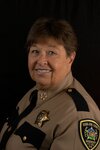Wind: 3.5 mph, W
Welcome to our new web site!
To give our readers a chance to experience all that our new website has to offer, we have made all content freely avaiable, through October 1, 2018.
During this time, print and digital subscribers will not need to log in to view our stories or e-editions.


With support from Sheriff Kim Stewart, a Las Cruces mental health therapist has set up a wellness program at the Doña Ana County Sheriff’s Office (DASO) to help move officers and deputies from being “the first to be the helper and the last to be helped” into a culture where they support each other in “staying healthy so they can help others.”
The program got its start in early 2021, not long after the suicide of a sheriff’s deputy. Psychologist Robyn Rehbein, who had begun working with the department as a volunteer, was awarded a contract in 2022 to help set up a DASO wellness and mental health program.
Rehbein guided deputies in selecting an eight-member peer support team they can turn to for emotional support, assistance and referrals in navigating on-the-job issues like officer-involved shootings, domestic and child abuse and dealing with the mentally ill, as well as personal issues such as problems in a marriage or the death of a loved one. She also has overseen peer training, and ensures that all peer support is conducted in strictest confidence, she said.
Peer support team members are “our ambassadors to wellness,” said Rehbein, who is a licensed professional clinical mental health counselor and a certified first responder counselor who has a private practice in Las Cruces and has been providing therapy for more than 15 years.
“We look at wellness from every aspect,” Rehbein said, including spirituality, financial and family issues – how life impacts work and how work impacts life at home.
The program has given deputies “a place to go to be heard (by) people who understand, because first responders are different,” said a DASO officer who has been with the department for nearly 20 years and is a peer support team member. “There is no way somebody who doesn’t do what we do can understand.”
The “demands are immeasurable,” he said, and officers also must deal with “constant criticism.”
“We’re expected to solve every problem with limited resources and limited authority,” the officer said.
That means making “split-second decisions” that call for skills as a law enforcement officer as well as “a social worker, a minister, a tough guy, a gentleman, a teacher and a report writer,” he said.
“It’s not about giving them advice,” the officer said. “We don’t do that. It’s about listening and helping them to come up with their own solution.”
Another senior officer who was nominated for the support team by his fellow officers said he received support himself in late 2021 as he dealt with the sudden death of a family member.
“We had peer support in place and I’m glad we did,” Rehbein said.
She and the sheriff were part of the group that visited the officer at his home.
“They were very supportive,” he said, “in the most professional manner ever. That helped a great deal. I didn’t feel alone.”
The peer support program has made DASO “a better department,” the officer said. “I’ve been through it. The peer support program has made DASO “a better department. I’ve been through it. It may help save lives and careers,” the officer said. “We deal with a lot.”
Part of Rehbein’s job has been to make everyone in DASO aware of the peer support program, its 140 deputies and its 50 support personnel. The program is also included in the training and mentoring cadets receive at the DASO training academy every year, she said.
“We’re very proud of the work we’ve done,” Rehbein said. Other law enforcement agencies “wish they had what we have.”